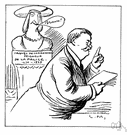markedly
Also found in: Thesaurus, Medical, Legal, Financial, Idioms, Encyclopedia.
marked
(märkt)adj.
1. Having one or more distinguishing marks.
2. Clearly defined and evident; noticeable: a marked increase in temperature. See Synonyms at noticeable.
3. Singled out, especially for a dire fate: a marked man.
4. Linguistics
a. Of or relating to that member of a pair of words or forms that explicitly denotes a particular subset of the meanings denoted by the other member of the pair. For example, of the two words lion and lioness, lion is unmarked for gender (it can denote either a male or female) whereas lioness is marked, since it denotes only females.
b. Explicitly characterized by or having a particular linguistic feature. For example, girls is marked for plural in English, whereas sheep is not.
mark′ed·ly (mär′kĭd-lē) adv.
mark′ed·ness n.
American Heritage® Dictionary of the English Language, Fifth Edition. Copyright © 2016 by Houghton Mifflin Harcourt Publishing Company. Published by Houghton Mifflin Harcourt Publishing Company. All rights reserved.
ThesaurusAntonymsRelated WordsSynonymsLegend:
Switch to new thesaurus
| Adv. | 1. |  markedly - in a clearly noticeable manner; "sales of luxury cars dropped markedly" markedly - in a clearly noticeable manner; "sales of luxury cars dropped markedly" |
Based on WordNet 3.0, Farlex clipart collection. © 2003-2012 Princeton University, Farlex Inc.
markedly
adverb noticeably, greatly, clearly, obviously, seriously (informal), signally, patently, notably, considerably, remarkably, evidently, manifestly, distinctly, decidedly, strikingly, conspicuously, to a great extent, outstandingly The quality of their relationship improved markedly.
Collins Thesaurus of the English Language – Complete and Unabridged 2nd Edition. 2002 © HarperCollins Publishers 1995, 2002
Translations
بصورةٍ واضِحَه أو مَلْحوظَه
očividně
klart
greinilega
belirgin şekilde
markedly
[ˈmɑːkɪdlɪ] ADV1. (with adj/adv) [different] → notablemente, marcadamente; [better, worse] → visiblemente, notablemente
their second album has been markedly more/less successful than their first → su segundo álbum ha tenido notablemente más/menos éxito que el primero
their second album has been markedly more/less successful than their first → su segundo álbum ha tenido notablemente más/menos éxito que el primero
2. (with verb) [increase, improve, decline] → notablemente, sensiblemente; [differ, change, contrast] → notablemente
Collins Spanish Dictionary - Complete and Unabridged 8th Edition 2005 © William Collins Sons & Co. Ltd. 1971, 1988 © HarperCollins Publishers 1992, 1993, 1996, 1997, 2000, 2003, 2005
Collins English/French Electronic Resource. © HarperCollins Publishers 2005
markedly
adv improve, increase, differ, change → merklich; quicker, slower, more, less → wesentlich; it is markedly better → es ist wesentlich or bedeutend besser; not markedly so → nicht, dass es auffallen würde; they are not markedly different → es besteht kein wesentlicher or großer Unterschied zwischen ihnen
Collins German Dictionary – Complete and Unabridged 7th Edition 2005. © William Collins Sons & Co. Ltd. 1980 © HarperCollins Publishers 1991, 1997, 1999, 2004, 2005, 2007
Collins Italian Dictionary 1st Edition © HarperCollins Publishers 1995
mark
(maːk) noun1. (also Deutsche Mark, ~Deutschmark (ˈdoitʃmaːk) ) the standard unit of German currency before the euro.
2. a point given as a reward for good work etc. She got good marks in the exam.
3. a stain. That spilt coffee has left a mark on the carpet.
4. a sign used as a guide to position etc. There's a mark on the map showing where the church is.
5. a cross or other sign used instead of a signature. He couldn't sign his name, so he made his mark instead.
6. an indication or sign of a particular thing. a mark of respect.
verb1. to put a mark or stain on, or to become marked or stained. Every pupil's coat must be marked with his name; That coffee has marked the tablecloth; This white material marks easily.
2. to give marks to (a piece of work). I have forty exam-papers to mark tonight.
3. to show; to be a sign of. X marks the spot where the treasure is buried.
4. to note. Mark it down in your notebook.
5. (in football etc) to keep close to (an opponent) so as to prevent his getting the ball. Your job is to mark the centre-forward.
marked adjective obvious or easily noticeable. There has been a marked improvement in her work.
ˈmarkedly (-kid-) adverb noticeably. It's markedly easier to do it by this method.
ˈmarker noun1. a person who marks eg the score at games.
2. something used for marking, eg in scoring, showing the position of something etc. The area is indicated by large green markers.
3. a type of pen, usually with a thick point.
ˈmarksman (ˈmaːks-) – plural ˈmarksmen – noun a person who shoots well. The police marksman did not kill the criminal – he wounded him in the leg to prevent him escaping.
ˈmarksmanship noun a person's skill as a marksman.
leave/make one's mark to make a permanent or strong impression. The horrors of the war have left their mark on the children.
mark out1. to mark the boundary of (eg a football pitch) by making lines etc. The pitch was marked out with white lines.
2. to select or choose for some particular purpose etc in the future. He had been marked out for an army career from early childhood.
mark time to move the feet up and down as if marching, but without going forward. He's only marking time in this job till he gets a better one.
Kernerman English Multilingual Dictionary © 2006-2013 K Dictionaries Ltd.